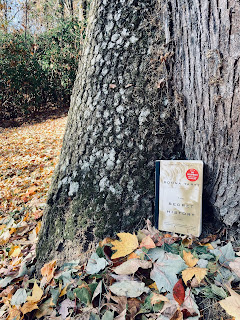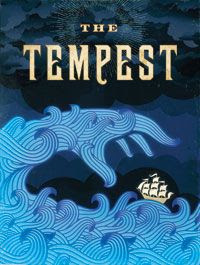February has come and gone and
come again and that means I'm a full year overdue for everyone's favorite playwright,
Willy Shakes. And consequently, that means it is also way past time for a new favorite blog post from yours truly. Because if there's any consistent feedback I've gotten since starting this blog, it's that you people are here for the Bard. So let me just apologize here and now for completely skipping the Shakespeare posts in 2023. Let's see if I can take a page from Prospero's book and conjure you up a good one today.
We open on a gnarly storm with a ship floundering at sea carrying Alonso the king of Naples and a bunch of his nobles. The ship is coming apart fast and the king and his son are literally begging God to spare them while the duke, Antonio, is busy cursing the ship's captain and crew for bringing them all to their deaths. As if they can control the weather. Or want to die anymore than anyone else on this ship.
Like, seriously, calm down Antonio.
But as it turns out, this isn't any ordinary storm. The next scene takes us to a nearby island where Antonio's brother Prospero has been living for the last twelve years with his daughter Miranda. As it turns out, that creep Antonio usurped his brother's position as Duke of Milan and had the king banish him. Prospero is, naturally, a powerful sorcerer and has conjured up this storm to take revenge on all his enemies. He has enslaved the island's only inhabitant, Caliban, and also a spirit called Ariel to do his bidding. So, I mean really, Prospero isn't the greatest guy either. Maybe Antonio wasn't that far off-base in having him banished. Poor Miranda, though, am I right? Sis is just caught in the crosshairs of a battle of toxic masculinity. Bless her.
Anyway, the ship wrecks on the island according to plan, and, using his magic, Prospero splits up the survivors into groups on the island to carry out his vengeful plans. Oh and the captain and crew are put into a magical sleep until the end of the play because we can't be bothered with them. We have enough characters to keep track of as it is.
First up, we have Ferdinand, the king's son who is stranded by himself so that Prospero can pick him up and manipulate him into an engagement with his fifteen year old daughter Miranda all the while lecturing them both about the value of chastity. Pretty rich coming from him.
Then we have the court jester and the majordomo who run into Caliban and offer us our "comic relief" in the play by bumbling around the island together plotting their own little rebellion against Prospero. Like that's going to work out.
Next we have the group of lords including the traitorous king (Alonso), Prospero's backstabbing brother (Antonio), the king's brother (Sebastian), Gonzalo (an old counsellor who's just doing the best he can out here), and a couple of other lords who I didn't really care about. Basically, Antonio convinces Sebastian that they should try to kill Alonso so that Sebastian can become king. What good this is going to do them seeing as they are stranded on a desert island is anyone's guess, but the general idea is: everyone is plotting evil against everyone else. Except for poor old Gonzalo and the two young lovers Ferdinand and Miranda.
Ariel comes and torments Alonso, Antonio, and Sebastian until they feel so guilty for their crimes against Prospero and each other that they all run off to wander around until we need them again in the play.
Act IV is basically Prospero instructing the island spirits to put on a masque celebrating the betrothal of Ferdinand and Miranda—while simultaneously continuing the lecture about staying chaste until the actual wedding—but it gets cut off when Prospero remembers that there are three dopes running around the island plotting to kill him. So there's that.
Prospero orders Ariel to bring the nobles to him so we can have our big showdown. Ariel, by the way, has been begging Prospero the whole play to set him free and Prospero once again promises that once Ariel does everything he wants him to do, he will finally set him free. (I had my doubts that Ariel would ever be free of Prospero, but don't worry: he actually is free by the end of the play.) So Ariel sets off to do Prospero's bidding. In the meantime, Caliban, Trinculo, and Stephano are chased into the swamp by goblins.
Ariel shows back up with the nobles and Prospero promptly forgives them. What?! What have we even been doing here this whole time? They basically restore Prospero to his rightful position as Duke of Milan. Ariel fetches everyone else and Caliban basically tucks tail and promises to be good, Prospero sends Trinculo and Stephano away in shame, Ariel is charged with blessing them with good weather for the return trip home, and they all leave. Ariel is finally free of Prospero, and Miranda and Ferdinand go on planning their happily ever after. Prospero asks us, the audience, to free him by our applause and the play is over.
The Tempest is probably one of the last plays Shakespeare wrote and it's kindof a mess, but it was fun nonetheless. I read it in a day. It's an easy one to read, but it wouldn't be the first comedy I'd direct you to if you're going to read Shakespeare. It falls in the class with some of his other late plays which don't fit neatly into either the comic or tragic categories so it just feels like there is a lot going on the whole time. If it were up to me, I'd take Miranda and Ferdinand out of it entirely and let all those crazy guys die on the island with their plotting and scheming. But that's Shakespeare for you.
Next up is The Merchant of Venice which I'll probably read this weekend, and I promise I won't wait another year to post a recap of it!



